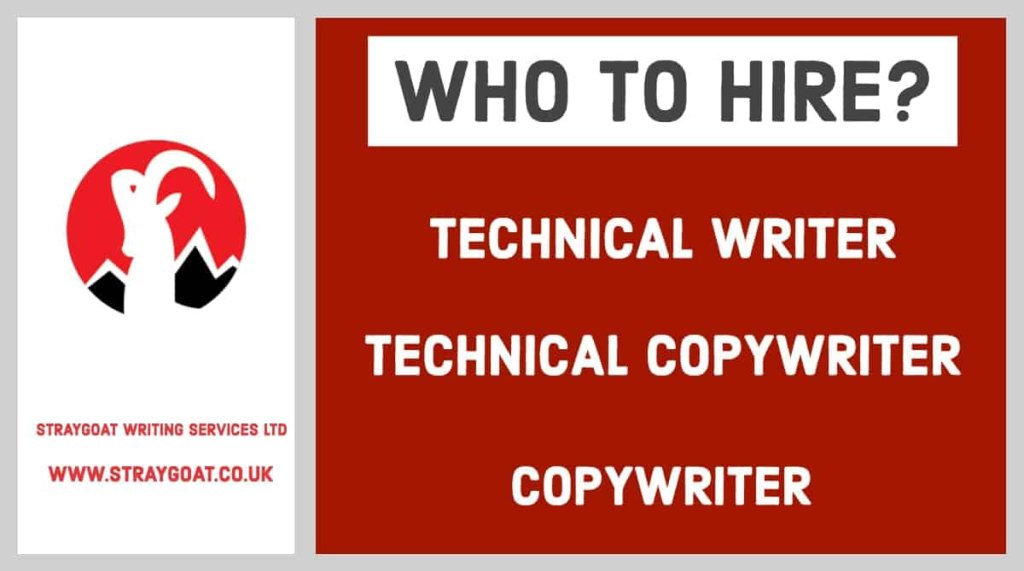If you’re not part of the marketing or documentation world, it’s easy to get confused between these three common, but different, writing professions:
Technical writer (also known as a technical author, especially in the UK)
Technical copywriter
Copywriter.
You probably just know that you need a good writer, but if you’re going to make a good choice, knowing the difference between the disciplines will make your search a lot easier.
I've worked in all three roles, so can help you understand the difference. And then, just to confuse things, I'll explain why you still need to judge the situation for yourself.
What is a Technical Writer?
Traditionally, a technical writer is someone who creates content that explains how to use a product or service. Some technical writers also document processes and procedures, such as the manufacturing process in a business.
The audience can vary dramatically. Some technical writers explain how things work to the general public, others are very much embedded in industry and explain complex and niche products. There are also specialised types of content, such as API documentation for software developers.
A good technical writer explains the context, the 'how to' steps, and the results. Think of these as the 'what, when, why, how, and what happens next?'. All too often with technical documents, you'll see there is a lack of context, which causes a problem. Anyone can follow an instruction, but you need to understand why and when to take action.
Technical writers often work on user guides, instruction manuals, white papers, online help systems, ebooks, instructional web pages, and sometimes video and e-learning.
Modern technical authoring tools are far more complex than Word (although Word is still used). They are designed to let writers create modular content, where sections are written in individual chunks so that they can be reused in different manuals and help pages. This means that technical writers need to have a strategic view of documentation and know about content reuse and filtering features. They manage and plan content in bulk, as well as write it.
What is a Copywriter?
A copywriter is a marketing writer. They write content that is designed to promote or sell. Typically, this comes in the form of advertisements, case studies, direct mail, etc., all of which are designed to:
Attract the reader’s attention
Create a rapport with the reader
Explain how the product/service will make the reader’s life better
Make the reader desire the product/service
Call the reader to action – either get them to buy or get them to make contact in some way.
Think of a copywriter as a salesperson who works with the written word rather than the spoken. They produce content that is designed to attract attention and guide the reader through the buying process, from grabbing the reader's attention to getting them to click on buy.
Copywriters work on all sorts of media, including brochures, advertisements, videos, scripting, etc. It is quite unusual for copywriters to use advanced authoring tools, because they generally focus on one piece of content and don't have to consider reuse and writing content to scale.
What is a Technical Copywriter?
A technical copywriter is a copywriter who specialises in technology. So their focus is selling and promoting, just like a regular copywriter. However, a technical copywriter is more likely to come from a tech background and have a more in-depth understanding of technology.
Confusion!
Here's why it's so confusing for people to understand. In the industry, you will find technical writers who call themselves technical copywriters. You will also find copywriters who create informative content, which is pretty much technical writing.
To make things even more difficult, there are also content designers, who mostly work on web content. But they do a mix of copywriting and technical writing.
So how do you decide on who to hire?
Tips for Hiring a Writer
There are several things to consider when hiring a writer:
Is your content to sell or inform?
Is your content part of a bigger suite of content? For example, a user guide for a product and there are 6 similar products that also need user guides.
Is your content going to be translated?
Is your content technical?
If your content is for supporting customers and helping them to use your products, a technical writer could be your best bet. Especially if you need to produce content for multiple products and these need to be localised. Look for a technical writer with knowledge of modern authoring tools such as MadCap Flare, Paligo, or any XML editor that supports DITA. Why? Because it will save you a lot of money. The modular approach to creating content is easier to translate and reuse, so will save time and reduce ongoing translation costs.
If your content is for marketing, choose a copywriter. Copywriters are skilled in the more creative content that's needed to guide the reader through the buying process. For very technical products, a technical copywriter is likely to be a better choice, as they will be used to dealing with complex technology.
Few copywriters deal with content created to scale, so they are unlikely to know about content reuse strategies, conditional text, and single sourcing. Although that could change as the need to manage content more efficiently grows.
Who Feels Right?
When you are hiring someone to write for your business, remember that they are going to be the voice of your business. So take the time to read their work and see if their tone and style creates the right impression. Don’t look for writers who create complex sentences packed with obscure word or jargon – this style won’t be effective as copywriting or technical writing. The message has to be engaging and clear.
Also bear in mind that your writer will most likely need to interact with you, members of your team, and possibly your customers. Choose a writer who is easy to get along with, adapts to problems with the right attitude, and conducts themselves in the right way. They don’t have to be super-professional or a corporate robot, but they should be sensitive to other people’s feelings, timescales and pressures.


